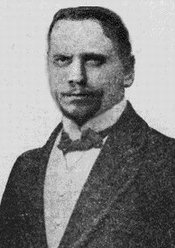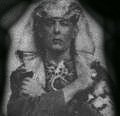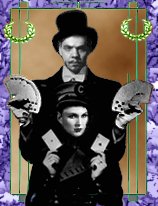The Strange Life of Dutch Falconi
The following biography was pieced together from numerous sources, and is as reliable as one can hope for concerning such an enigmatic character. I have had the luxury of being able to interview Dutch on many occasions, and by often presenting him with a bottle of Scotch as a gift, I have unearthed fragments of his history about which he usually keeps silent. The rest comes from rumours, innuendo, and hearsay.
The Early Years
A song and dance man, he had been one of the top stars of Vaudeville, playing top New York City theaters like the legendary Palace Theater along with the likes of Eddie Cantor, Al Jolsen, Nora Bayes and even W.C. Fields.
 Holland Fortunado Falkon was born May 27, 1899. (Those who know him say he is a classic Gemini.) He was the only son born to Dario and Hannalore Falkon, who had left their gypsy clan in Central Europe ten years earlier. They sought a better life for themselves and their family, and hoped to live comfortably as entertainers on the vaudeville circuit. They billed themselves as the Famous Falconi's, performing song, dance and comedy routines. Their act was only marginally successful and really did not take off until they made the precocious Holland a part of the show. Audiences adored the little tyke who would sing songs and dance around the stage. "'lil' Dutch Falconi" soon became so popular that his parent were able to retire from performing and concentrate on their only child's career. So it was in the spotlight that Dutch grew up, and that is where he has always been most accustomed to being.
Holland Fortunado Falkon was born May 27, 1899. (Those who know him say he is a classic Gemini.) He was the only son born to Dario and Hannalore Falkon, who had left their gypsy clan in Central Europe ten years earlier. They sought a better life for themselves and their family, and hoped to live comfortably as entertainers on the vaudeville circuit. They billed themselves as the Famous Falconi's, performing song, dance and comedy routines. Their act was only marginally successful and really did not take off until they made the precocious Holland a part of the show. Audiences adored the little tyke who would sing songs and dance around the stage. "'lil' Dutch Falconi" soon became so popular that his parent were able to retire from performing and concentrate on their only child's career. So it was in the spotlight that Dutch grew up, and that is where he has always been most accustomed to being.
As he grew older, his only activities centered around the entertainment industry, and his only friends were fellow stars.
Dutch hit his peak in 1928, at the height of the roaring twenties, headlining every show, touring Europe succesfully (even playing before the Queen of England), with his star anchored firmly.
The Decline
All that changed after the Great Crash. Dutch liked to gamble not only in the Casinos (he reportedly once threw down $10,000 on Black-4 at a roulette table and won!) but also on the stock market, and his heavy investments in Soybeans went belly up. That, coupled with the advent of the talking motion picture, and the rapid decline of vaudeville, left Dutch penniless and hungry for work.
Many people have wondered why Dutch did not make the transition to the Hollywood as so many of his friends had done. The rumours are vague, but there seems to have been an incident involving a Hollywood party at the home of Louis B. Mayer. Legend has it that Dutch and Mayer were involved in a fistfight (some say it was over a woman, others a gambling debt), and Mayer swore afterwards that Dutch would never see himself on the silver screen. Whether this story is true or not (and Dutch himself refuses to talk about it), that promise seems to have been kept.
Broke and out of work, his friends and enemies long gone, Dutch stayed in the New York City - the city he called his home - but fell into the Great Depression with the rest of the U.S. The scandal sheets would run stories occasionally, and then only to tsk-tsk at the depths to which he had fallen. He kept working to some degree, but to much smaller crowds, and in dingier theaters. The big shows were for stars who had made it in Hollywood, a door Dutch had slammed in his face.
He started to drink heavily, became addicted to heroin, and was eventually a caricature of himself. When he got a laugh from an audience, it was often unintentional.
The Turnaround
This sad lifestyle lasted through much of the 30's until 1936, when an extraordinary change came over Falconi. Having hit rock bottom, he did an about face and started making efforts to improve himself.
It seems Dutch Falconi became involved in the occult.
Abroad
This is where his story gets sketchy, and Dutch himself has kept strangely silent on the following years.
 He seems to have left New York soon after begging enough money to book passage to Europe. The War disrupted his plans though, and he was forced to leave England. Biographers next place him all over Europe the next several years, eventually landing in Egypt, where he stayed until the end of the war. It was there Dutch reportedly became a member of the Egyptian Order of the Illuminati.
He seems to have left New York soon after begging enough money to book passage to Europe. The War disrupted his plans though, and he was forced to leave England. Biographers next place him all over Europe the next several years, eventually landing in Egypt, where he stayed until the end of the war. It was there Dutch reportedly became a member of the Egyptian Order of the Illuminati.
Mexico and the Countess
After the war, stories place him in all over the globe, in places like India, South Africa, the Far East, eventually coming back to the Western Hemisphere, but this time in Mexico.
This brings us to 1950.
In Mexico he knew and befriended William Burroughs. He claims to have given Burroughs advice on quitting his heroin addiction. (When Burroughs is asked, he claims with a slight frown never to have known Dutch Falconi.)
Although Dutch would now be approximately fifty years of age, those who knew him would say he didn't look a day over thirty.
One witnesses was the Countess Esmeralda Fontina, a Russian member of Royalty living in exile in Mexico City at the time Dutch Falconi arrived. Her story is also quite remarkable. Her family had fled Russia at the time of the Revolution when the Countess was a little girl. They eventually settled down in Mexico where they were safe from the Communists for many years. But her parents were killed in a freak motorcar accident when she was a nineteen, leaving her with an ample sum of money to live comfortably on. She stayed in Mexico for years, however, because it was all she knew - she left Russia at a very young age - and she lacked the courage to set forth in the world.
This is where Falconi came into the picture.
When she first set eyes on the new stranger in town, the Countess says she knew immediately that her life would somehow be involved with this exotic, tall, dark stranger with the piercing eyes but friendly laugh. Dutch must have felt it too, for soon after meeting, the two of them were rarely apart. Esmeralda saw in Dutch the adventurous life she wanted to live but lacked the courage to, and Dutch saw in Esmeralda the buried royalty that needed to be unearthed.
They stayed in Mexico for approximately one year. The Mexican authorities had little trust of Falconi, and kept an eye on him most of the time. Strange lights and sounds would often emanate from the Countess' household, mostly late at night. Finally, the authorities - fed up with the fears and complaints of the neighbors - took steps to drive Dutch out. But one day, as several officers approached the house to warn him of possible deportion, they found it deserted, with the furniture still in place, but Dutch and the Countess nowhere to be found. It was the last that Mexico would ever see of Dutch Falconi.
Back Home
The two resurfaced again several years later, this time in Dutch's old home of New York. Eager to grace the stage once more, Dutch started performing a magic act. Esmerelda was his assistant.
 Those old enough may recall seeing this famous act appear on many shows in the Golden Age of Television. Falconi would perform the same feats of magic most other magicians at the time had mastered, such as making objects disappear, levitiation, mind-reading, etc., with the mysterious and charismatic Countess as his assistant. But with Falconi, one would get the eerie feeling that his magic was real - that he was actually invoking strange powers. The act was very popular for a time, second only to Houdini's, and Dutch was finally back in the limelight he enjoyed.
Those old enough may recall seeing this famous act appear on many shows in the Golden Age of Television. Falconi would perform the same feats of magic most other magicians at the time had mastered, such as making objects disappear, levitiation, mind-reading, etc., with the mysterious and charismatic Countess as his assistant. But with Falconi, one would get the eerie feeling that his magic was real - that he was actually invoking strange powers. The act was very popular for a time, second only to Houdini's, and Dutch was finally back in the limelight he enjoyed.
But he was a changed man. Gone was the heavy drinker and party-goer. The new Dutch was a recluse. He seldom gave interviews, and when he did, preferred only to speak of magic and nothing else. The gossip magazines were left to invent stories on their own, and many did. Because of his youthful appearance, many requests were made of Falconi to divulge his secrets. For Dutch had kept in remarkably good health. Even though he had to be in his mid fifties at the time, he still did not look much older than thirty.
On rare occasions, a news article would speculate real magic might be involved. But these ideas were never taken seriously.
The End of an Era
On February 23, 1959, Dutch Falconi made a surprise announcement that he was retiring from performance and was moving to the West Coast.
When asked for his reasons he was enigmatic, as usual.
going to be. New York is my town, but I have to go see what else
is going on in the world, you dig? California is the place for me."

Go Back to Falconi's Home Page
OR